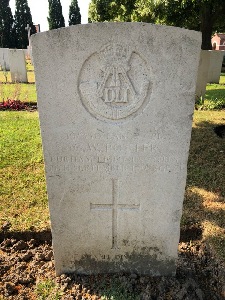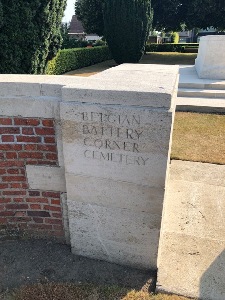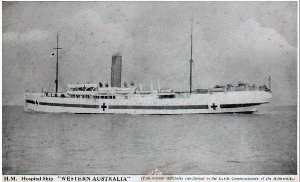
Belgian Corner Cemetery: Pauline Priano

Belgian Corner Cemetery: Pauline Priano

Hospital Ship Western Australia
Pauline Priano has submitted the following:-
George William Potter was one of 11 children, of whom only 3 survived. His father John Potter was born August 16th 1874 at Tyne Dock, South Shields, County Durham as was his wife Mary Jane Pearson in 1876, they were married in 1896. George William was the eldest of their surviving children, born 1897, John who was born at 62, Napier Street, Tyne Dock, South Shields in 1901 died 1-year old in 1902. John Potter Snr supported his family employed as a railway engine stoker, his wife over the next ten years gave birth to a further 9 children of whom by 1911 only 3 had survived, Margaret Aldrich born August 26th 1906, Nicholas Hogg 1908 and Stanley Pearson Potter 1910, who appears in the 1911 census but died 1-year old later that year. In 1911 the Potter family were living in 4 rooms at 50, N.E.R. Cottages, Green Lane, Tyne Dock, South Shields, which came with John Potter’s job as a fireman at the North East Railways locomotive depot. Living in with them was William Potter, widowed, retired crane man N.E.R. George William (14) worked as a labourer at the colliery.
During the 1st quarter (Jan/Feb/Mar) 1914 Mary Jane Potter nee Pearson died aged 38 years, within a few months Britain and her dominions were at war with Germany. George William enlisted aged 19 years 1 month, March 1st 1915 at South Shields, declaring he lived at 124, Frederick Street, employed as a labourer. He was assigned as Private 330 to the newly formed 19th Battalion Durham Light Infantry, a Bantam Battalion, consisting of men below the required high of 5 feet 3 inches as the War Office had lowered the minimum height for new recruits after the initial rush to enlist had dwindled. Private Potter was sent to Hartlepool before moving to Cocken Hall, the home of Earl Durham given over to the war effort as a training facility. A firing rage had been built and trenches dug to simulate front line action, in June 1915 the battalion was moved to Marsham and on to Salisbury Plain for final training. Attached to the 106th Brigade, 35th Division the regiment departed from Southampton, January 3rd 1916 arriving in France, however, their first taste of action did not come until they entered the trenches at Neuve Chapelle, February 11th 1916.
They remained in the sector subjected to constant shelling and gas attacks. Private Potter was gassed March 14th 1916 and admitted to hospital for 10 days before returning to duty. July 1st 1916 the battalion was moved south by rail to the Somme. They entered the trenches near Longueval but did little fighting, engaged mainly in repairing and digging new communication and reserve trenches under constant shell-fire. George William was admitted to the 1st Australian General Hospital at Rouen, July 24th 1916, suffering from shell shock and repatriated July 27th aboard the Hospital Ship Western Australia.
During his recuperation period he was married to Lavinia Jary, born at South Shields, September 20th 1899, in the parish of St. Jude, South Shields, December 26th 1916. Whilst his wife was pregnant he was considered fit enough to rejoin his regiment, June 23rd 1917 he was assigned with the same service number to the 3rd Reserve Battalion Durham Light Infantry at South Shields part of the Tyne Defences and also a retraining unit for men like himself who had been suffering from illness or recovering from wounds as well as training new recruits. Unfortunately, he absented himself without permission from June 26th 1917 until August 21st and spent 11 days in the guard room before being taken to hospital. He escaped from hospital the following day until he surrendered himself, October 2nd 1917, spending a further 8 days in the guard room. Reading between the lines it is obvious he still was not a well man.
October 12th 1917 he was tried by the D.CM for 1) absenting himself without leave, 2) losing by neglect his clothes and regimental necessaries, 2nd Charge Sheet, 1) when in confinement escaping. Found guilty on all charges he was sentenced to 6 months' detention.
During this tumultuous time his wife gave birth to a daughter, Dorothy Jane Jary Potter, 4th quarter (Oct/Nov/Dec) 1917.
His sentence was remitted by 162 days on condition he be posted back to the front with the first available draft. Attached to the 12th Battalion Durham Light Infantry he departed from Folkestone, October 30th 1917, disembarking at Boulogne that same day and joining his regiment in the field in Belgium. Private Potter returned to the 35th Infantry Base Depot at Etaples, France and was reposted to the 19th Battalion, November 12th, making his way back to Belgium where his regiment had been participating during the 2nd Battle of Passchendaele.
They remained in the Ypres sector until February 1918 when the 19th Battalion transferred to the 104th Brigade, 35th Division. They fought during the First Battle of Bapaume, March 24th-25th, and the Final Advance in Flanders (Belgium) until the Armistice of November 11th 1918.
Private 330 George William Potter died September 15th 1918 and was interred at Belgium Battery Corner Military Cemetery on the outskirts of Ypres, Belgium, grave II. N. 7. He was 21 years of age.
His widow of 154, Palmerston Street, South Shields, received all monies due to him, a pension for herself and their daughter and his awards of the British War Media and Victory Medal. Lavinia commissioned at a cost of 7 shillings 10 pence an additional inscription to be added to her husband’s military headstone, it reads, “Death Divides But Memory Clings.”
Lavinia Potter remarried in 1920 to Henry L. Kershaw, her sister Dorothy Jane Templeman Jary married his brother Joseph. Not having found a death entry for Henry L. Kershaw the possibility exists he and Lavinia may have divorced. Lavinia married for a third time in 1940 to Richard B. R. Midlane, Lavinia Midlane-Kershaw-Potter nee Jary died in 1976, registered at South Shields, aged 77 years.
Exact details as regards George William and Lavinia’s daughter as yet unknown.
In 1939 George William’s father John had retired and was living at 116, Green Lane, South Shields with his daughter Margaret Alditch Potter and a Margaret Potter, born November 22nd 1927, relationship unspecified.
John Potter died in 1941 aged 66 years at South Shields, County Durham.
In God’s safe keeping. Rest In Peace.
George William Potter is remembered at South Shields on S86.009
He is also remembered in The DLI Book of Remembrance page 245

